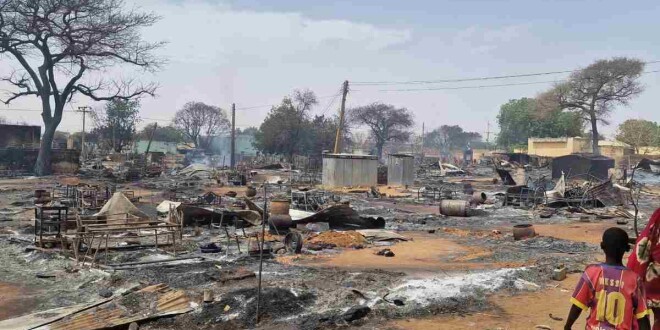15 November 2023
El Geneina, a city in West Darfur, has endured a harrowing chapter in its history, characterized by a devastating war that left a wake of human rights violations and appalling crimes. Despite initially appearing safe at the onset of the current conflict, its tranquility shattered on the 24th day of April when the warring parties centered their fighting around it. The violence has since taken on an ethnic turn, leading to a new round of ethnic cleansing and demanding urgent action. In mid-June 2023, the brutal massacre of more than 1,100 civilians in El Geneina was determined by both the US Department of State and the Sudan Conflict Observatory and local sources to be a deliberate act of ethnic violence targeting non-Arab communities, in particular members of the Massalit community. Actual numbers of the thousands killed in El Geneina could be higher. Several neighborhoods in El Geneina have been plundered and torched by the RSF since the war erupted. Hundreds of people are being sexually assaulted whilst women are being subjected to slavery and kidnapped for a ransom. Unfortunately, this is just the latest cycle of a pattern of violence that stretches back more than 20 years. It is a vivid symbol of the failure of the commitment to end genocide and ethnic cleansing.
Achieving accountability for the atrocities committed in El Geneina and Sudan in general is crucial for healing, justice, and lasting peace. Urgent intervention is needed to alleviate the beleaguered health sector, support civil society, address limited movement, and provide basic necessities in a bid to spare the lives of civilians living in a state of horror.Accountability for the crimes committed during the war in El Geneina is a multifaceted process that involves international and regional mechanisms, truth and reconciliation commissions, and civil litigation. Pursuing justice is not solely about delivering retribution to the victims but also about preventing future atrocities and establishing a foundation for lasting peace.
The International Criminal Court (ICC), as a beacon of hope for victims of heinous international crimes, should continue to issue arrest warrants for individuals implicated in the Darfur conflict. By extending its investigations to include the crimes committed in El Geneina, the ICC can play a pivotal role in ensuring accountability for the war crimes and crimes against humanity that have occurred in the region.
While the African Child Committee primarily focuses on safeguarding the rights of African children, it can also address crimes against children in conflict zones. The crimes committed in El Geneina have reportedly had a deep impact on children. It is crucial to engage with the African Child Committee to ensure that the rights of children are upheld and that perpetrators of crimes against them are brought to justice.
Truth and Reconciliation Commissions(TRCs) are often established in post-conflict or transitional societies to uncover the truth about past atrocities, promote reconciliation, and make recommendations for addressing impunity. TRCs provide victims with a platform to share their stories and recommend measures for reparations. Advocating for a dedicated TRC for El Geneina is an essential step in the pursuit of accountability and reconciliation. It can help document the crimes, acknowledge the suffering of victims, and contribute to the healing process.
Civil litigation allows individual victims to seek justice and reparations through legal proceedings. Victims can file lawsuits against those responsible for the crimes committed during the war. Legal assistance and support from regional and international human rights organizations play a crucial role in empowering victims to pursue civil cases. Civil litigation not only holds perpetrators accountable but also provides financial compensation to victims and acknowledges their suffering.
Sudan’s international partners, including foreign governments, the UN, African Union, and European Union, should:
- Affirm the need for fair, credible prosecutions of past atrocity crimes.
- Express the importance of cooperation with the ICC in its Darfur cases.
- Identify expertise and assistance that may be available to support such efforts.
Conclusively, the international community, local organizations, and advocates must work in harmony to ensure that those who committed these heinous crimes are held accountable. This is not only a matter of justice but a significant step toward a brighter future for El Geneina and its people.
Ms. Christine Kirabo Nampiima
Legal Program Officer
ACJPS
This post is also available in: Arabic
 African Centre for Justice and Peace Studies ACJPS | المركز الافريقي لدراسات العدالة و السلام
African Centre for Justice and Peace Studies ACJPS | المركز الافريقي لدراسات العدالة و السلام




